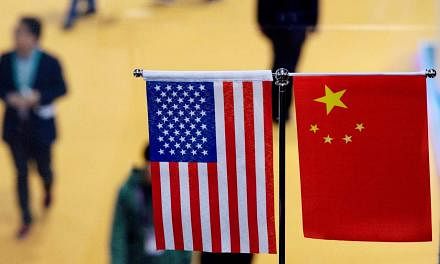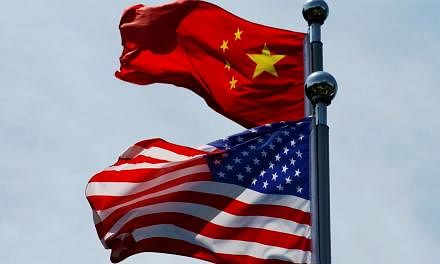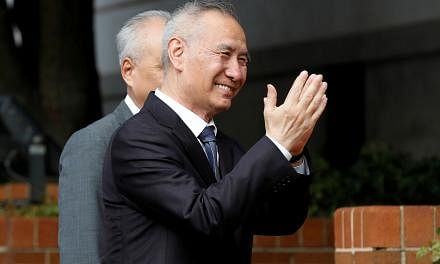SINGAPORE - Once the global economic system starts to be fragmented, including in capital markets and technology, countries will be in for a lower trajectory of growth, said Minister for Trade and Industry Chan Chun Sing on Monday (Sept 30).
He was answering a question about the impact of potential United States restrictions on fund flows to China, following reports over the weekend that Washington is considering measures such as delisting Chinese companies from US stock exchanges.
The development came just a week or so before the two superpowers, who make up about 40 per cent of the global economy, enter another round of high-level trade talks.
"I think today, the interdependencies between different economies, between different companies and countries are much deeper than what many of us will give it credit for," Mr Chan told a day-long conference about the impact of digitalisation trends on businesses.
The situation today could bring about two scenarios, he added, noting that companies must be able to operate in either. In one case, there would be greater global integration, with people realising how much more interdependent parties are. In the other, the world could fragment into two or more pieces.
The question is how companies can learn to operate across different economic blocs, he added.
Whether the US and China come to any agreement in the trade war, the world has woken up to the realisation that things will not go back to what they were before, said Mr Chan at the Digitise Asean conference organised by the Singapore Business Federation (SBF) and Asean Business Advisory Council (Asean-BAC).
"Everybody is taking the need to de-risk their operations very seriously," he added.
But he maintains that the world is at a crossroads. Governments and businesses have to decide if it will go on a higher growth trajectory with greater integration, or become fragmented digitally, financially and as a global economy.
Governments are responsible for fostering global digital integration, he said, adding that Singapore is working with like-minded countries and companies on new international approaches to support the digital economy. Notably, these are in facilitating data flows, setting standards and helping businesses to seize opportunities.
But businesses have a role to play as well to champion an integrated market to their respective governments, helping to remove many of the non-tariff barriers that are in place.
"Even if the rest of the world runs the risk of being fragmented by different standards, Asean has every opportunity and responsibility to make sure that our… market remains integrated," he said.
Asean is the fastest-growing Internet market in the world, with its digital economy projected to add an estimated US$1 trillion (S$1.38 trillion) to regional gross domestic product in the next decade, according to the World Economic Forum.
Besides the role that governments in Asean can play towards fostering tech adoption, Asean-BAC Singapore chairman Robert Yap noted in a speech that other issues remain - such as the difficulties small and medium-sized businesses face in obtaining financing.
He also stressed the need for workers to have the right mindset for tech adoption, at the event in Bulim Avenue attended by more than 250 policymakers, business leaders and academics from the region.
Chairman of the Asean-BAC 2019 Arin Jira added that the council recognises the importance of "human capital empowerment as a precondition to compete in the digital era", and this involves boosting the skills of workers to avoid job losses.
SBF chief executive Ho Meng Kit noted the "abundant opportunities" for Singapore companies as Asean works to reap the benefits of the Internet economy. These lie especially in e-commerce and its supporting digital services, such as payment solutions, fraud detection and digital marketing services, he said.
The event also saw the launch of an Asean Applied Research Centre, which brings Asean researchers together to find solutions for logistics challenges and serves as an industry sandbox to validate solutions before they are implemented.






